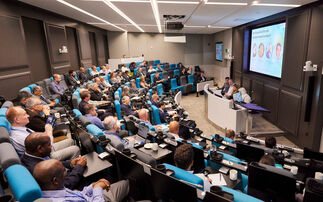
The U.S. government is leading a concerted effort to create a global coalition of like-minded democracies with the goal of combating disinformation originating from countries such as Russia and China.
During a recent gathering at the U.S. Embassy in London, James Rubin, the U.S. special envoy and coordinator of the Global Engagement Centre (GEC), underscored the significance of support from allies in combating information warfare originating from Russia, China, Iran and various terrorist groups.
The majority of their efforts are directed toward Russia and China, as these countries use information warfare extensively as part of their foreign policy strategies.
He also addressed Iran's support for terrorist groups in the Middle East, enabling them to conduct operations that result in regional chaos.
The U.S., UK and Canada have recently endorsed the Framework to Counter Foreign State Information Manipulation, solidifying their collective recognition of the threat and providing a comprehensive approach to tackling the challenge posed by foreign information manipulation.
The framework delineates five key action areas essential for combating foreign state information manipulation:
- National strategies and policies: Underscores the importance of comprehensive strategies to counter foreign information manipulation, safeguarding freedom of expression, protecting marginalized groups, ensuring media ownership transparency, and fortifying electoral processes against external interference.
- Governance structures and institutions: Advocates for the establishment of dedicated government institutions to lead and coordinate national efforts, facilitating international engagement and promoting fact-based digital communication in response to foreign manipulation.
- Human and technical capacity: Highlights the necessity of bolstering technical capabilities and human resources to detect and counter foreign state information manipulation.
- Civil society, independent media, and academia: Recognizes the indispensable roles played by civil society, independent media, and academia in supporting government-led initiatives, advocating for media literacy, and promoting independent fact-checking to counter foreign manipulation.
- Multilateral engagement: Stresses the significance of multilateral cooperation in addressing information manipulation, urging collaboration among international organizations to mitigate capability shortfalls and enhance resilience across partner nations.
"The time is now for a collective approach to the foreign information manipulation threat that builds a coalition of like-minded countries committed to strengthening resilience and response to information manipulation," reads a joint statement issued by the US, the UK and Canada earlier this month.
"We can do this through coordinated, whole of society solutions that work with experts, independent media and multilateral organizations, to address these transnational security threats."
During his visit to London, Rubin underscored the importance of transparency, asserting that governments engaging in information manipulation must be held accountable by disclosing their involvement.
Drawing on his extensive diplomatic and journalistic experience, he acknowledged the complexity surrounding the delineation of disinformation.
Further, he emphasized the need to combat disinformation perpetrated by foreign powers while upholding the principles of free speech.
"In principle every government should be free to convey their views, but they should have to admit who they are," he told The Guardian.
"We want to promote more fact-based information, but at the same time find ways to label those information operations that are generated by the Chinese government or the Kremlin but to which they don't admit."
Rubin also highlighted the need for collaboration between governments and social media platforms to unmask foreign disinformation campaigns.
Addressing concerns about the misuse of the term "disinformation," he cautioned against its indiscriminate application.
"The word disinformation can become like fake news, just a label for saying you don't like something. That is not what we are talking about."
This article originally appeared on our sister site Computing.
















